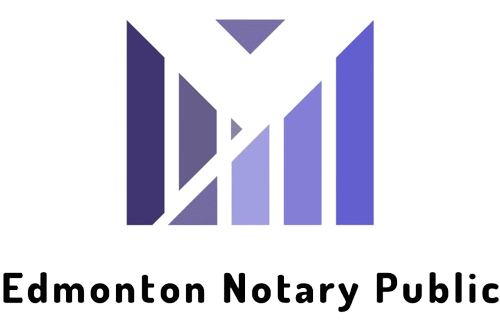PRICING
Edmonton Notary Public: Same Day Service
Get your documents notarized by a Lawyer
How Can I Pay?
We accept credit card, debit card, cash and interac-e-transfer. To use our notary and legal services, an appointment must be booked in advance.
CLICK BELOW to book an in-person appointment at our location.

Intellectual Property
- Copyright Registration :$375
- Trademark Registration: $850
Business Registration
What's Included?
- Register Sole-Proprietorship: $160
- Register Tradename: $160
- Register General Partnership: $175
- Register Alberta Corporation: $499
- Register Extra-Provincial Corporation: $575
$35
per service
What's Included?
- First notary seal/stamp
- Certified True copies, witness signature, statutory declaration, swear oaths, affidavit of execution, notarize IRCC invitation & sponsorship letter, power of attorney, personal directive and many more
- Joint signatories/joint statutory declaration: $15 extra
- Additional notary seal/stamp: $15 each
$75
per service
What's Included?
- Notary services for Statutory Declaration in lieu of Guarantor for Passport applications includes Certification of Photograph and Certification/attestation of 2 pieces of Govt. issued Photo IDs
- ONLINE NOTARIZATION (For limited types of documents - for more information, contact us)
$75
per service
What's Included?
- Notary services for Will with GA8 Affidavit of Witness to Will
- Agreement With Agent for Verification of Client Identity for Real Estate transactions
$120
per service
What's Included?
- Draft/Review/Edit IRCC invitation letter for parents, relatives, friends etc.
- Draft/Review/Edit IRCC Sponsorship letter for minor & adult students
- Draft/Review/Edit affidavit/statutory declaration
- Draft Single Status Affidavit
- Notarize Transfer of Land documents
$150
per service
What's Included?
- Draft General Power of Attorney
- Draft Specific Power of Attorney
- Draft Enduring Power of Attorney
- Draft Personal Directive
- Make Changes to Will via Codicil
- Draft by-laws for corporation & non-profit organization
- Personal Guarantee Notarization
$200
per service
What's Included?
- Mobile Notary Public.
- Additional $25 for travelling outside North Edmonton
$325
per service
What's Included?
- Real Estate Closing (Canada & Foreign jurisdictions):
-Notarization of all documents
-Scanning & Emailing the notarized documents to the closing lawyer/agent
-Courier and mailing available for an additional fee
- Draft General Partnership Agreement
- Draft Limited Partnership Agreement
$0.50
Print/Photocopy: per page
$1.00
Scan: per page
Business Registration: form
Registering a business in Alberta, Canada involves several steps. Here is a general guide to help you through the process
1. Choose a Business Name
Ensure the name is unique and not already in use.
Check the availability of the chosen name through our online portal.
2. Determine the Business Structure
Decide on the legal structure of your business (e.g., sole proprietorship, partnership, corporation).
Each structure has different registration requirements.
3. Register the Business
For sole proprietorship or partnership or corporation: Register the business name with the Alberta Corporate Registry through our online portal.
Alberta Corporation
Alberta Tradename
Extra-Provincial Registration
Alberta Corporation
In Alberta, Canada, incorporating a business involves the process of creating a legal entity separate from its owners.
Here are the key steps for Alberta incorporation:
1. Choose a Corporate Name:
Select a unique and available name for your corporation. Ensure it complies with the naming guidelines set by the Alberta Corporate Registry.
2. Determine Share Structure:
Decide on the share structure of the corporation, including the number and types of shares to be issued.
3. Prepare Articles of Incorporation:
Draft and file the Articles of Incorporation with the Alberta Corporate Registry. This document outlines key details about the corporation, such as its name, registered office address, share structure, and purpose.
4. Appoint Directors:
Identify and appoint directors for the corporation. Directors are responsible for the overall management and decision-making.
5. Obtain a NUANS Report:
Before filing the Articles of Incorporation, obtain a NUANS (New Upgraded Automated Name Search) report to ensure the chosen name is unique and not in use.
6. File Documents:
Submit the completed Articles of Incorporation, along with the required fees, to the Alberta Corporate Registry. This can be done through our online portal.
7. Receive Certificate of Incorporation:
Once the documents are processed, the Alberta Corporate Registry will issue a Certificate of Incorporation, confirming the legal existence of the corporation.
8. Obtain a Business Number (BN):
Business Number (BN) with the Canada Revenue Agency (CRA) is automatically generated by Alberta Corporate Registry once the business is registered.
10. Consider Professional Advice:
Incorporating a business in Alberta provides limited liability protection to its owners and establishes a distinct legal entity. The process aims to create a framework for effective governance and operation while ensuring legal and regulatory compliance. Businesses considering incorporation should carefully plan and seek professional guidance to navigate the process smoothly.Seek advice from our corporate lawyer to ensure compliance with all legal requirements and to understand the implications of incorporating. Our corporate lawyer can guide you through the whole process.
Alberta Tradename
Trade Name, also known as a "doing business as" (DBA) name or an operating name, can be owned by both individuals and corporations.
Individual Ownership: An individual, such as a sole proprietor, can register a trade name to operate their business under a name other than their own legal name. This allows them to conduct business using a more recognizable or marketable name while remaining personally responsible for the business's liabilities.
Corporate Ownership: A corporation, which is a separate legal entity from its owners (shareholders), can also register a trade name to conduct business under a specific name. This is common for corporations that want to operate under a different brand or want to use a name that is more suitable for their business activities.
Extra-Provincial Registration
In Canada, Extra-Provincial Registration (also known as Extra-Territorial Registration or Foreign Registration) is a process that allows a business entity registered in one province or territory to operate in another province or territory. This is important because each province and territory in Canada has its own set of regulations governing businesses, and if a company wants to conduct business beyond its home jurisdiction, it generally needs to register in the additional jurisdictions where it operates.
Here are the key points to consider regarding Extra-Provincial Registration in Canada:
Business Structure:
Extra-Provincial Registration is typically required for corporations, limited partnerships, and other types of business entities.
Application Process:
The process for Extra-Provincial Registration varies by jurisdiction, but generally involves submitting an application to the relevant regulatory authority. This application may require details about the company, its structure, and its activities in the new jurisdiction.
Name Approval:
Some provinces may require a business to get name approval before it can register. This ensures that the business name is unique and complies with local regulations.
Fees:
There are usually fees associated with the Extra-Provincial Registration process. These fees vary by jurisdiction.
Registered Agent:
Some provinces may require businesses to appoint a local registered agent who can accept legal documents on behalf of the company in that province.
Compliance Requirements:
Once registered, a business must comply with the ongoing reporting and filing requirements of the new jurisdiction. This may include filing annual reports, updating corporate information, and paying any required fees.
Penalties for Non-Compliance:
Non-compliance with Extra-Provincial Registration requirements can result in penalties, fines, or other legal consequences.
It's important to note that the specific requirements and processes may vary between provinces and territories, so it's advisable to consult with our corporate lawyer before you proceed with registration.
Ask a Business Lawyer
The primary purpose of asking a Business lawyer is to obtain legal guidance and insights regarding various aspects of running a business. This can include advice on share structures, drafting contracts, ensuring compliance with regulations, and protecting intellectual property.
Our Business lawyers have specialized knowledge in business-related legal issues. They can provide clarity on complex legal matters, helping business owners make informed decisions that align with applicable laws and regulations.
Choosing the right legal structure for a business is crucial. Our Business lawyers can advise on whether to operate as a sole proprietorship, partnership, corporation, or other entity, considering factors such as liability, taxation, and operational flexibility.
Our Business lawyers charge only $99 plus GST for a 20 minutes phone consultation session.
All Rights Reserved | Edmonton Notary Public | Privacy Policy

